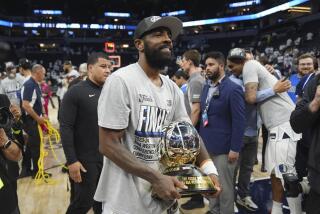COMMENTQARY : Playoff Burden Falls Heavy on Superstars--Ask Patrick Ewing
- Share via
It’s one of those deceptions of sports when the superstar says that if he can look in the mirror and tell himself he tried his best, then he’s comfortable with whatever he did. If he really means it, then he doesn’t understand the situation.
Lesser players can get away with that. Patrick Ewing cannot. “Mirror, mirror on the wall . . . “ won’t give him a comfortable answer.
The burden of success and failure belongs to him; the effort goes without saying. These are not just any games in December in an endless season.
“This guy can turn a game or a series of games around,” was the way Al Bianchi, the general manager, put it before the New York Knicks first put a rubber toe on the parquet in Boston.
The facts of life say that if that guy can do it, then he should do it.
The superstar has the obligation to take the game and turn it around with his bare hands--or die trying. He’ll drink muddy water, sleep in a hollow log if that’s what it takes.
“The ability to take over a game,” was the way it was defined Tuesday by Maurice Cheeks, who saw how Julius Erving and Charles Barkley dominated the moment for Cheeks’ team when he played in Philadelphia. “That’s why they’re superstars.”
It’s not unreasonable for the Knickerbockers to expect that from Ewing; they haven’t got it. Not in his first playoff series, hardly in last year’s playoffs and certainly not in the two games this time around. There will be no genuine run at a championship until he can give it to them.
When an athlete is playing and being paid on that level, the burden rises comparably. They’re not depending on Brian Quinnett; they are depending on Ewing.
It’s unfair to think it’s been all his fault because it hasn’t. Basketball is still a team game. Others have to help out on defense; others have to get him the ball more. But in big games big players have to come up big. They’re the ones who make the contributions of the little players important.
Do you think for a minute that Gil Hodges didn’t take it personally when he went 0 for 21 and the Dodgers lost the 1952 World Series, or that Dave Winfield was able to brush away his 1 for 22 when he brushed his teeth in 1981?
It was the role Reggie Jackson created for himself, and he loved every minute of playing Mr. October. “It’s being able to do something well when you recognize how important it is,” Jackson said, rising to the question when he came to New York as an Angels’ broadcaster last week.
“Magic Johnson, Larry Bird, Dr. J rose to the occasion and when they did, nobody was surprised. Don Mattingly understands the extraordinary is expected.”
That kind of player had his own gift for stepping into the fire and not letting it burn him. He has the mentality for being able to slow the pace of the action that’s coming at him a hundred miles an hour. It doesn’t mean that he doesn’t sense the heat. To the contrary.
Note that Jackson played on 11 division champions and five pennant winners. “You look at it as an opportunity to succeed,” he said. “You don’t look at it as a chance of failing. When a player says it’s just another game, that guy is not a great player.”
Ewing was a great player this season. “An absolute monster,” Bianchi called him. The Knicks sent out an elaborate mailer pumping Ewing for Most Valuable Player.
With the Knicks feeling the increasing heat of elimination, Bianchi is protective, as general managers usually are. But he raised the distinction between playing in December and January, and playing in May and June, which is when championships are won in this calendar.
In May the game they play in the National Basketball Assn. is a different game: There is no yielding. Barkley has modified his game to deal with the double-teaming; Ewing has said that Robert Parish is too big to handle. That says intimidation, and Parish is no longer anything near the physical specimen Ewing is.
“We’re not talking about the great Boston teams of yesteryear,” Bianchi said.
Fats Waller, the jazz piano great, once concluded a song with a dazzling cascade of notes, and then softly, as an aside, confided, “It’s easy if you know how.”
Ewing played fairly well in the first playoff game, but the only thing in which he led the team was free throws missed. The box score of the second game suggests he didn’t do badly with 28 points, but that missed the point entirely.
In the second quarter, when the Celtics were destroying the Knicks, Ewing did nothing to stop them. He got two shots, both of them follows. He scored two points, a rebound basket for the Knicks’ last basket of the first half. By then the game was over.
Go back to the great upset of recent college basketball history: Villanova beating Georgetown, 66-64, in 1985. Ewing scored 14 points and had five rebounds. He did not take over the game.
In 15 playoff games during the last three seasons, Ewing has been high scorer once and high rebounder twice. This is a player who has all the physical skills to dominate a game or a series of games.
“Patrick has given good effort,” Stu Jackson, the coach, said. “He’s tried to do the things we want.”
He’s willing and he works so hard, but the superstar’s obligation is greater.
More to Read
Go beyond the scoreboard
Get the latest on L.A.'s teams in the daily Sports Report newsletter.
You may occasionally receive promotional content from the Los Angeles Times.










